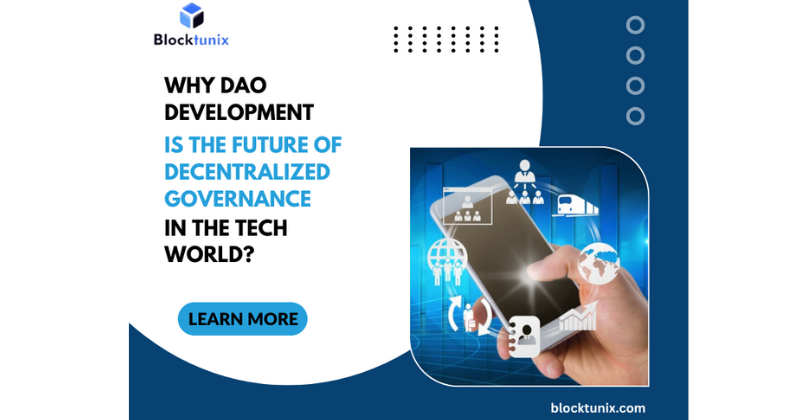Why DAO Development is the Future of Decentralized Governance in the Tech World?
 Olivia Anne
Olivia Anne
Introduction: Why Decentralized Governance Matters in Today’s Tech World
In a rapidly evolving tech landscape, one question remains at the forefront: How do we ensure that governance keeps pace with technological advancements? Centralized systems, while historically effective, are increasingly showing their limitations—lack of transparency, vulnerability to corruption, and inefficiencies in decision-making processes. So, what if governance itself could be decentralized, democratized, and made more transparent? Enter DAOs (Decentralized Autonomous Organizations). Could DAO development be the answer to the challenges faced by modern governance structures? How might it reshape the tech world as we know it? Let’s explore why DAO development is not just a trend but the future of decentralized governance.
What is a DAO? Understanding the Basics
Before delving into why DAO development is critical for the future, it’s essential to understand what a DAO is. A DAO is a blockchain-based organization governed by smart contracts rather than a central authority. Unlike traditional organizations where decisions are made by a few individuals at the top, DAOs operate on a decentralized network, allowing stakeholders to vote on key issues, allocate resources, and drive the organization’s direction. This structure not only enhances transparency but also incorporates blockchain in cybersecurity, ensuring that all transactions and governance actions are secure and immutable.
To put it simply, a DAO is like a well-oiled machine that runs autonomously, guided by code and the collective input of its members. It’s governance without the middlemen, a peer-to-peer organizational structure where power is distributed, not concentrated.
How DAO Development is Revolutionizing Governance
The development of DAOs marks a significant shift in how organizations can be structured and governed. Here’s why:
Decentralization and Transparency: Decisions taken under traditional governance structures are frequently made in secret, leaving a lack of transparency. Conversely, DAOs provide total transparency. All members have access to the blockchain record of every decision, vote, and transaction. Within the company, trust is increased, and accountability is guaranteed by this degree of openness.
Democratic Participation: Each member of a DAO is allowed to speak. Token ownership is a common indicator of voting power, which guarantees that decisions are made by the group as a whole. By preventing the concentration of power, this democratic method encourages a more inclusive form of government.
Efficiency and Automation: Traditional governance processes can be slow and cumbersome. DAOs streamline these processes by automating tasks through smart contracts. This automation reduces human error, speeds up decision-making, and ensures that organizational operations are carried out efficiently.
Borderless and Inclusive: DAOs are not bound by geographical constraints. Anyone, anywhere in the world, can participate in a DAO, provided they hold the necessary tokens. This inclusivity allows for a diverse range of voices and perspectives, fostering innovation and creativity within the organization.
Challenges in DAO Development: What Needs to Be Addressed?
While DAOs offer many advantages, their development is not without challenges. Addressing these challenges is crucial for DAOs to realize their full potential in decentralized governance.
Security Risks: DAOs are built on smart contracts, which are not immune to bugs or vulnerabilities. A flaw in the code can be exploited, leading to significant losses. Therefore, thorough auditing and testing of smart contracts are essential to mitigate these risks.
Legal and Regulatory Uncertainty: The legal status of DAOs is still a gray area in many jurisdictions. Since DAOs operate without a central authority, it’s challenging to assign liability or responsibility in case of disputes. Clear regulatory frameworks need to be established to support the growth and adoption of DAOs.
Governance Complexity: While the decentralized nature of DAOs is a strength, it can also be a weakness. Reaching a consensus among a large, diverse group of stakeholders can be time-consuming and complex. Effective governance models that balance decentralization with efficiency are needed to ensure that DAOs can operate smoothly.
Real-World Applications: How DAOs Are Shaping the Future
The potential applications of DAOs are vast, extending far beyond the tech world. Here are a few examples of how DAOs are being used today:
Decentralized Finance (DeFi): DAOs are at the heart of the DeFi movement, managing everything from lending platforms to decentralized exchanges. By removing intermediaries, DAOs make financial services more accessible and affordable.
Venture Capital: DAOs are disrupting the traditional venture capital model by allowing investors to pool resources and vote on which projects to fund. This democratizes the investment process and gives power back to the investors.
Social Organizations: DAOs create a decentralized social network where users are in control of their data and the governance of the platform, which is opposed to social media platforms where the user data is centralized and then leveraged to monetize their information.
Creative Communities: DAOs are being used by artists and creators as a vehicle to manage joint projects, distribute royalties, and finance new works. This would mean that income can be divided more equitably among its members, ensuring that creators retain control over the distribution of their work.
Conclusion: Why DAO Development is the Future of Governance
As we look toward the future, it’s clear that traditional governance models are becoming increasingly obsolete in the face of rapid technological change. DAOs offer a promising alternative, one that is transparent, inclusive, efficient, and borderless. But are DAOs the ultimate solution to the challenges of modern governance? While they are not without their challenges—such as security risks, legal uncertainties, and governance complexities—they represent a significant step forward in how we can organize and govern in a decentralized world.
The development of DAOs is not just a technological advancement; it’s a reimagining of governance itself. By embracing DAOs, we have the opportunity to create more equitable, transparent, and efficient organizations that are truly of, by, and for the people. So, are you ready to be a part of this future? If you’re considering building a DAO, now is the time to act. The future of decentralized governance is here, and it’s up to us to shape it.
Partnering with a trusted DAO development company can help you navigate the complexities and unlock the full potential of decentralized governance. Don’t wait—start your journey toward a decentralized future today.
Subscribe to my newsletter
Read articles from Olivia Anne directly inside your inbox. Subscribe to the newsletter, and don't miss out.
Written by

Olivia Anne
Olivia Anne
I'm Olivia Anne, an IT professional at Blocktunix, a trailblazing tech company shaping the future of decentralized finance (DeFi) and digital ownership. With a knack for building scalable blockchain solutions and optimizing smart contracts.